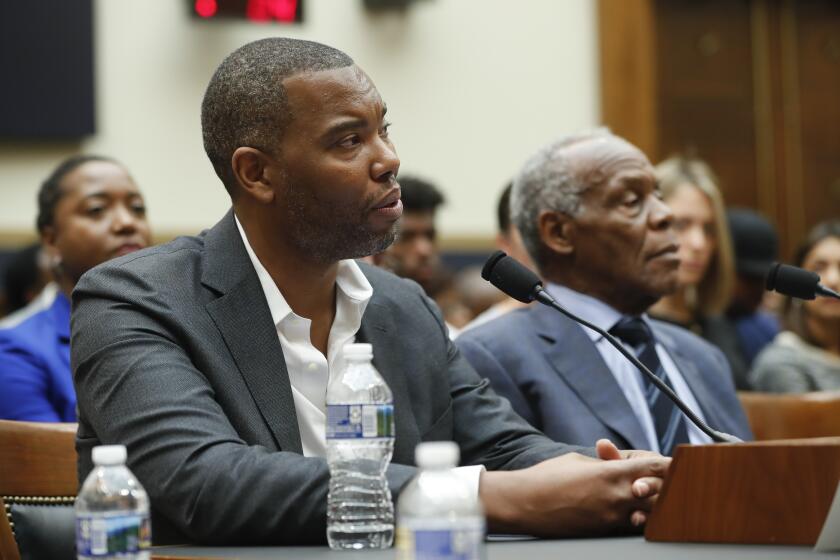Losing the Farm : THE LAST FARMER : An American Memoir <i> by Howard Kohn (Summit Books/Simon & Schuster: $18.95; 252 pp.) </i>
Chekhov said it was not a writer’s work to solve questions, but to pose them correctly.
In this quietly told and warmly reassuring memoir, old age compels a Midwestern farmer and his uprooted writer son, the author, to ask what will be lost if a small family farm is given up.
For the father, Fred Kohn, 70, the grandson of an original German homesteader in Michigan’s Saginaw Valley and a Lutheran with a strong ethic of hard physical work, it means a wrenching break with continuity. His small farm, cultivated with old-fashioned methods, barely provides a living. None of his six children want to take it over.
For the oldest son, Howard Kohn, nearly 40, a writer who lives back East, has worked in Hollywood and on the staff of Rolling Stone, it means a growing but inchoate feeling of loss. Kohn is a realistic and skillful writer and he describes contemporary farm life as it is. And because the reader grows so conscious of the author’s question, you become absorbed in it.
The feeling is set off when the father, already weakened by a heart seizure, falls from the roof of his house when the son happens to be home for a visit. Kohn writes:
“Had he died that morning, I cannot say how the past few years would have turned out. He and I, and whatever lay between us, would have been fixed at that point--he in his place in Old America, with his Germanic standards on his one hundred and twenty-acre farm in Beaver Township, and world of his father and grandfather; and I in no particular place at all.”
But Fred Kohn does not die. He picks himself up, his cracked ribs mend and he goes right on farming. In increasingly frequent visits home the next several years, his son, at last, comes to know him and understand his feelings about religion, family and the land. There is some suspense--what will happen to the father? To the farm? But the book’s real strength comes when Kohn catches himself and his father, usually undramatically doing farm chores, revealing their inner lives in quiet everyday speech.
For example, the father refuses to sell drilling rights on his land to an oil company as his neighbors are doing, although he could use the money. “What do I want to get rich for?” he asks. Howard asks him what would happen if a sudden windfall made him a millionaire? “Once you’ve got it, it’s hard not to love it,” says the older man.
This is really a book about contemporary American culture. An older generation has inherited rules and beliefs, rooted in religion, family and property. A younger generation wants freedom of choice, life styles that can come and go, be easily discarded, changed or kept. As Kohn says:
“The organizations and places that laid claims on me--Students for a Democratic Society, the Washtenaw County divorce court, the San Francisco hippie scene, Hollywood, the Los Angeles rock world, Rolling Stone magazine, the New York publishing establishment, and so forth--were as foreign as could be to my father.”
Kohn’s precise choice of detail and dialogue (he is the author of “Who Killed Karen Silkwood?”) marvelously convey what rural Michigan is like. To get to a wood lot, “we could no longer drive down the cow lane through the eighty and take the rounded concrete bridge across the creek.” Once, looking up, he is reminded “how mind-emptying open trees and open sky can be.” Or milking cows, how they had to “squeeze chromed pails between our knees, swish away, dodging the cow’s tail, which could slap you silly.” One caveat: As a native of North Dakota on the other bank, I feel duty bound to protest the “Red River Valley of Minnesota.”
But good as his descriptions are, “The Last Farmer” packs its dramatic punch from the very inability of its principal characters to fully communicate with each other. In a moving passage, Kohn gropes to find words to explain to his wife what he feels about losing the farm. He thinks to himself how most heirs of farmers must be in a fix:
“Stay on the farm and go broke, or leave and feel bad. It did not explain me. I had left without guilt. But what, then, was this longing in me? And how could I make Diana understand in a few hackneyed sentences what I did not understand myself?”
The American farm crisis is such that large numbers of people can identify with the Kohns, either father or son. “The Last Farmer” is objective, compassionate and true. I suspect a great many readers will feel personally grateful to this fine writer for posing so well the question of what it means to all of us.
More to Read
Sign up for our Book Club newsletter
Get the latest news, events and more from the Los Angeles Times Book Club, and help us get L.A. reading and talking.
You may occasionally receive promotional content from the Los Angeles Times.






